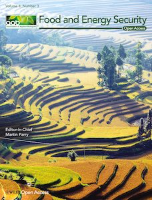
Food and Energy Security
Scope & Guideline
Empowering Research for Food Security and Energy Resilience
Introduction
Aims and Scopes
- Food Security Research:
Investigates the various dimensions of food security, including availability, access, utilization, and stability across different populations and regions. - Sustainable Agricultural Practices:
Explores agricultural practices that enhance productivity while minimizing environmental impact, including organic farming, agroecology, and integrated pest management. - Climate Change Adaptation:
Examines how climate change affects food systems and agricultural productivity, focusing on adaptation strategies to mitigate its impacts on food security. - Nutritional Quality Improvement:
Studies approaches to enhance the nutritional content of crops through biofortification and improved agronomic practices. - Technological Innovations in Agriculture:
Focuses on the use of advanced technologies such as genetic engineering, CRISPR, and precision agriculture to improve crop yields and resilience. - Economic Aspects of Food Production:
Analyzes the economic factors influencing agricultural practices, food systems, and market dynamics, including trade and policy implications. - Socio-cultural Factors in Food Systems:
Investigates the socio-cultural dynamics that influence food consumption patterns, agricultural practices, and food security outcomes.
Trending and Emerging
- Climate-Smart Agriculture:
Increasing publications on climate-smart agricultural practices highlight the need for resilience in food production systems in response to climate change. - Biofortification and Nutritional Enhancement:
Research focusing on biofortification of crops to improve nutritional quality is gaining momentum, reflecting a growing awareness of the importance of nutrition in food security. - Technological Advancements in Crop Improvement:
There is a notable trend towards exploring cutting-edge technologies like CRISPR and genome editing, which are being embraced for their potential to enhance crop resilience and yield. - Interdisciplinary Approaches to Food Systems:
An increasing number of studies are adopting interdisciplinary frameworks that combine insights from economics, sociology, and environmental science to address food security challenges. - Food Policy and Governance:
Emerging themes related to food policy, governance, and the political economy of food systems are becoming more prominent, particularly in the context of global food security discussions. - Impact of Urbanization on Food Systems:
Research examining the implications of urbanization on food production, distribution, and consumption patterns is on the rise, recognizing the complexities of feeding growing urban populations.
Declining or Waning
- Traditional Crop Varieties:
Research on traditional or indigenous crop varieties has decreased as the focus shifts towards genetically modified organisms (GMOs) and high-yielding varieties to address food security. - Conventional Agricultural Practices:
There is a noticeable decline in studies promoting conventional agricultural practices, as the trend moves towards sustainable and organic farming methods. - Local Food Systems:
Interest in local food systems and community-supported agriculture appears to be waning, possibly overshadowed by larger-scale agricultural solutions and global food systems discussions. - Livestock Production Systems:
Research specifically focused on traditional livestock production systems has decreased, with more emphasis now on integrated or alternative protein sources such as plant-based diets and aquaculture.
Similar Journals

Journal of Agricultural Sciences-Tarim Bilimleri Dergisi
Cultivating Knowledge in Agricultural SciencesJournal of Agricultural Sciences - Tarim Bilimleri Dergisi, published by Ankara University, Faculty of Agriculture, is a prominent open-access journal that has been fostering academic dialogue in the field of agricultural studies since 2010. With ISSN 1300-7580 and E-ISSN 2148-9297, this journal contributes significantly to the scientific community, particularly within the realms of agronomy, crop science, animal science, and plant science. As of 2023, it holds a Q3 classification in Agronomy and Crop Science, and Q4 in both Animal Science and Zoology and Plant Science, indicating its growing influence and dedication to advancing research in these areas. Situated in Turkey, this journal serves as a vital platform for scholars, professionals, and students, inviting submissions that enhance our understanding of agricultural innovation and sustainability. With a commitment to disseminating high-quality research, Journal of Agricultural Sciences ranks favorably within Scopus, providing an invaluable resource for exploring evolving agricultural paradigms.
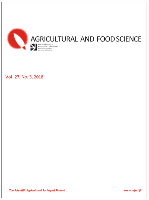
AGRICULTURAL AND FOOD SCIENCE
Innovating food science for global food security.AGRICULTURAL AND FOOD SCIENCE is a prestigious journal published by the SCIENTIFIC AGRICULTURAL SOCIETY OF FINLAND, dedicated to advancing knowledge in the fields of agricultural and food sciences. With an ISSN of 1459-6067 and E-ISSN of 1795-1895, this open-access journal has been providing valuable insights and research findings since its inception in 2002. As of 2023, it holds a Q3 ranking in Food Science and is positioned at the 46th percentile within its Scopus category, ranking 210 out of 389 journals in Agricultural and Biological Sciences – Food Science. The journal features contributions from a global network of researchers, covering various topics including sustainable agricultural practices, food safety, and innovative food technologies. Based in Finland, the journal serves as an essential platform for scholars, professionals, and students who are committed to enhancing food security and agricultural productivity through rigorous scientific research. The convergence of interdisciplinary studies from 2004 to 2024 marks a critical evolution in the scope of agricultural and food research, making this journal a vital resource for anyone involved in these dynamic fields.

Nature Food
Driving Innovation in Food Science and Sustainability.Nature Food, an esteemed journal published by NATURE PORTFOLIO, stands at the forefront of research in Agronomy, Animal Science, and Food Science. With its E-ISSN 2662-1355 and a remarkable recognition of being ranked Q1 in three essential categories by Scopus in 2023, it is tailored for researchers, professionals, and students dedicated to the advancement of knowledge in these fields. Situated in the United Kingdom and extending its reach globally, the journal has displayed an impressive ranking, placing it in the top percentiles of Agricultural and Biological Sciences, highlighting its vital place in fostering innovative research and scholarly communication. The journal's scope encompasses a wide array of topics critical to food systems, sustainability, and agricultural practices, making it an invaluable resource for anyone looking to stay ahead in this dynamic area of study. With access options designed to enhance the visibility and dissemination of research findings, Nature Food is committed to promoting open dialogue and collaboration among the global academic community, driving forward our understanding of food security and environmental stewardship.

Food Security
Fostering Collaboration for a Secure Food FutureFood Security is a premier academic journal dedicated to advancing knowledge and fostering dialogue surrounding the critical issues of food security and sustainability in a rapidly changing world. Published by Springer, this journal has established itself as a leading voice in the fields of Agronomy, Crop Science, Development, and Food Science, reflected in its impressive Q1 quartile rankings across these disciplines for 2023. With an impact factor showcasing its significant influence, Food Security is ranked in the top echelon of its domain, with notable positions in Scopus indices (Rank #7 in Agronomy and Crop Science, Rank #6 in Development, and Rank #13 in Food Science). Spanning articles from 2010 to 2024, the journal serves as a critical resource for researchers, professionals, and students seeking to address the complex interplay of agricultural practices, socio-economic dynamics, and environmental factors that contribute to food availability and accessibility on a global scale. While primarily subscription-based, Food Security ensures that its audience remains engaged with the latest research, policy discussions, and innovative solutions to combat food insecurity worldwide.

Frontiers in Sustainable Food Systems
Empowering change through innovative food system research.Frontiers in Sustainable Food Systems, published by FRONTIERS MEDIA SA, stands at the forefront of interdisciplinary research in sustainable food practices, agriculture, and global ecological impacts. This open-access journal, launched in 2018, aims to disseminate innovative findings that reshape our understanding of food systems' sustainability and resilience. With a significant impact factor and ranking in the top quartile across various categories such as Agronomy and Crop Science, Ecology, and Food Science, it is positioned as a leading platform for scholars and practitioners alike. The journal’s commitment to addressing the pressing challenges of food security and environmental sustainability ensures its relevance in today’s rapidly evolving landscape. It is a vital resource for researchers, professionals, and students dedicated to advancing sustainable practices in food systems globally.
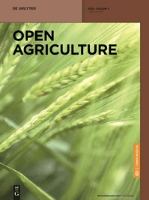
Open Agriculture
Advancing Agricultural Innovation through Open AccessOpen Agriculture, published by DE GRUYTER POLAND SP Z O O, is an innovative open-access journal dedicated to advancing research in the Agricultural and Biological Sciences. Since its inception in 2016, this journal has been committed to disseminating knowledge and facilitating collaboration among researchers, professionals, and enthusiasts in the agricultural sector. With an impressive Q2 ranking in the Agricultural and Biological Sciences category, it holds a prestigious position, ranking #65 out of 221 in its field, placing it in the 70th percentile. Open Agriculture offers a platform for high-quality research across a diverse range of topics, ensuring that crucial findings are readily accessible to the global scientific community. The journal continues to uphold its mission of promoting sustainable agricultural practices and innovations that address contemporary challenges in food security and environmental sustainability. With its strong commitment to open access principles, researchers and students alike can easily engage with cutting-edge research and contribute to the vibrant discourse surrounding modern agriculture.
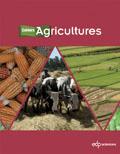
CAHIERS AGRICULTURES
Elevating agricultural science for global impact.CAHIERS AGRICULTURES is a distinguished open-access journal published by EDP Sciences S A, focusing on the vital fields of Agronomy and Crop Science, Animal Science and Zoology, as well as Management, Monitoring, Policy, and Law. With an ISSN of 1166-7699 and an E-ISSN of 1777-5949, this journal has notably maintained a strong presence in the academic landscape since its establishment, covering a wide range of topics pertinent to agricultural sciences. Based in France, CAHIERS AGRICULTURES fosters collaboration and knowledge sharing among researchers and practitioners through its open-access model, which has been in effect since 2014. The journal is recognized for its rigorous peer-review process, reflected in its competitive Scopus rankings, which place it in the Q2 quartile for both Agronomy and Crop Science, and Animal Science and Zoology. Researchers and scholars are encouraged to contribute cutting-edge findings that may influence agricultural practices and policy development. With a vision to advance sustainable agricultural practices, CAHIERS AGRICULTURES stands as a critical resource for advancing scientific knowledge and informing stakeholders in the agricultural sector.
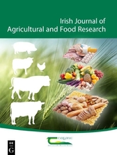
IRISH JOURNAL OF AGRICULTURAL AND FOOD RESEARCH
Advancing agricultural science for a sustainable future.Welcome to the IRISH JOURNAL OF AGRICULTURAL AND FOOD RESEARCH, an esteemed publication dedicated to the advancement of knowledge in the fields of agronomy, animal science, ecology, and food science. Published by TEAGASC, this journal has embraced open access since 2015, facilitating the dissemination of groundbreaking research to a global audience. With a robust ISSN of 0791-6833 and an E-ISSN of 2009-9029, the journal ranks in the third quartile (Q3) across multiple categories, highlighting its relevance and influence within the scientific community. The journal aims to serve as a platform for researchers and practitioners to share innovative findings and foster interdisciplinary collaboration to address pressing agricultural and food security challenges. With a focus on empirical and theoretical research, the IRISH JOURNAL OF AGRICULTURAL AND FOOD RESEARCH is vital for those seeking to make significant contributions to these critical areas of study.

Proceedings of the National Academy of Sciences of Belarus-Agrarian Series
Exploring cutting-edge research in agrarian practices.Proceedings of the National Academy of Sciences of Belarus-Agrarian Series is a distinguished journal dedicated to advancing the field of agrarian sciences through rigorous research and scholarly discourse. Published by the esteemed NATL ACAD SCIENCES BELARUS, this journal serves as a vital platform for academics and practitioners to disseminate innovative findings and methodologies that address contemporary challenges in agriculture and food security. With an ISSN of 1817-7204 and E-ISSN of 1817-7239, it aims to foster collaboration and knowledge exchange among researchers, professionals, and students alike. The journal, though currently not open access, maintains a commitment to high-quality peer-reviewed content that reflects the region’s unique agricultural context while contributing to global scientific discussions. In a world increasingly reliant on sustainable agricultural practices, the Proceedings of the National Academy of Sciences of Belarus-Agrarian Series plays a crucial role in shaping the future of agrarian science and policy.

GLOBAL CHALLENGES
Catalyzing Collaboration for Global Impact.GLOBAL CHALLENGES is a leading multidisciplinary journal published by Wiley-V C H Verlag GmbH, dedicated to addressing the critical and complex issues faced by our global society today. Since its inception in 2017, the journal has embraced an Open Access model, ensuring that its innovative research is readily available to a wider audience, fostering collaboration and knowledge sharing. With an impressive Q1 ranking in the Multidisciplinary category for 2023, it positions itself among the top 8% of journals in the field, further solidified by its 93rd percentile rank in Scopus. Covering a broad range of topics that intersect various disciplines, the journal seeks to inspire researchers, professionals, and students alike to engage with and contribute to solutions that resonate across diverse sectors. The ongoing commitment to advancing scientific knowledge and tackling pressing global challenges makes GLOBAL CHALLENGES an essential resource for anyone invested in the future of our planet.